Expert Tips for Choosing a Tech Partner for Your Business

Big ideas require big measures. No matter how great your idea is or what a great professional you are, you can’t do everything yourself. You don’t want to burn out completely before your product is even ready to hit the market, right? Besides, you should be able to take a step back and look at your product from a distance to see the bigger picture. This is why you need to find a technical partner for a project. The one who will be reliable; a vendor that will develop your product from scratch and support you all the way through.
From our 11-year-long experience of being a tech partner for different kinds of projects of any scale, we know that you don’t just give it away to any group of people to develop. When you’re looking for a startup technical partner to develop a complex web and/or mobile solution for you, you want the result to meet, or better yet, exceed your expectations.
In most cases, finding a technical partner for your startup that will be right just for you becomes your key to a successful project and further on, the life of your startup. How exactly do you choose a development team? How do you know if the company you’re looking at has the necessary resources to get your project done, and maintain and support it after launch? Start with a checklist of aspects that need to be looked at.
How Do You Find a Good Development Team? Find Out Who They Are, What They Know, and How They Work
If you want to partner with an IT company and want to choose a good development team, you need to know that it’s able to meet competition, but also how the team works from the inside, what they can offer, which technology and experts, etc. So, what are the main criteria to look at?
Human Resources
People are the most valuable part of any venture; no one will argue with that. It’s important to check how many people make up the team, and what their skills and specializations are; also, if there are enough experts for a full project development cycle, and if someone’s missing, if the company can quickly find good help on the outside.
Check what kind of specialists the company offers, so ideally you get people to provide full-stack services related to:
- Business and Technology Consultancy: Discovery phase – exploring possibilities, analyzing the needs of the business and your needs, understanding how they’re going to be implemented, choosing the right business model, market and competitors’ research; determining the necessary technology stack, cooperation model, as well as the project development process.
- Web Development: Building web applications ranging from lightweight MVPs to complex and custom solutions, as well as an ability to tackle any engineering challenges and satisfy all the most demanding requests.
- Mobile App Development: Development of both native and cross-platform apps.
- UX/UI Design: Creating human-centered, research-based, scalable interfaces following the best UX/UI practices.
Data Science: Extracting the necessary data from data in any form by applying scientific methods, processes, algorithms and systems. - Quality Assurance: An irreplaceable part of the development process, which must be present during the whole development cycle to make sure that the delivered product corresponds to requirements and industry standards.
- DevOps: DevOps approach allows to save up to 90% efforts spent on deployment and server maintenance. It reduces time to market by up to 50% and helps to identify quality concerns earlier.
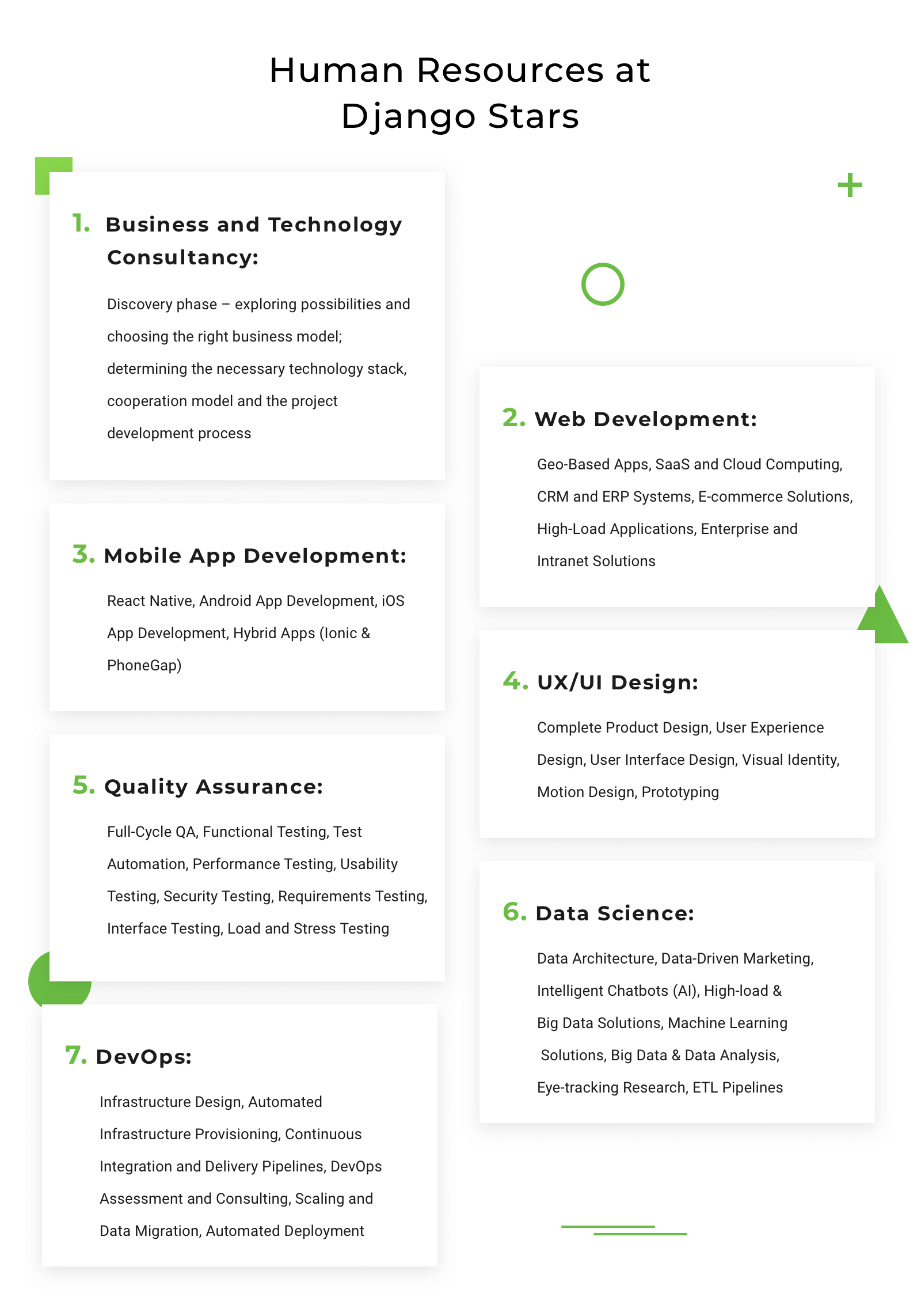
Consequently, as soon as you get started, you should get access to your own dedicated team of specialists that will cover all bases – from business analysts to project managers, from software engineers to UI/UX designers, from QA engineers to data science experts, from ML and AI experts to DevOps engineers. This way, whatever big plans you have, they will be able to develop your product from scratch.
Areas of Expertise
Any self-respecting, full-service development company by now should have gotten to the level at which they not only bluntly build a product, but also guide their partner and consult on how to build and scale a successful business around this particular piece of software. Who knows the product better than the people who made it?
Therefore, a good technical partner for a startup should be able to offer you help with choosing the right business model, and analyzing the market and your main opponents. The success of your technical partnership will largely depend on this. For example, at Django Stars, we focus on several domains and can be sure that we have enough expertise and experience to be a guide in these spheres:
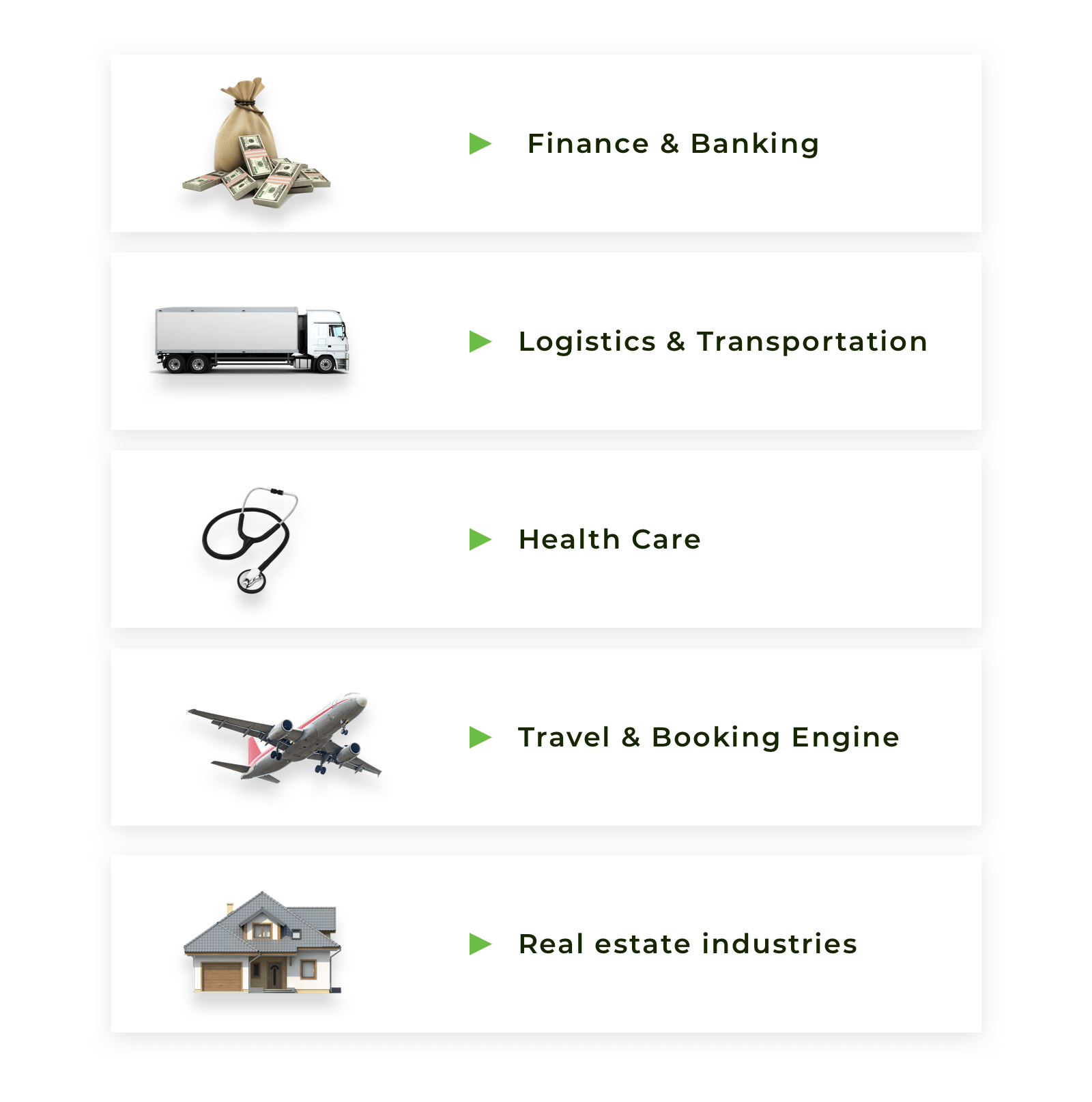
Before you go any further, be sure to check if your potential technical partner covers your branch. Also, talk about their experiences in this particular direction, other projects they’ve been a part of, and other products they have developed. Feel free to contact companies your future partner has worked with before and get some feedback, check for reviews online, etc.
If you want to see how up-to-date the company’s experts are, check out their achievements in cutting-edge technologies like Blockchain, BI & Big Data, AI, NLP, Cloud/SaaS, Mobile Technologies, or Fintech.
If you take fintech software development services, for instance, it’s a field that requires a deep understanding of the domain, terminology, all the different notions, needs of the end users, and even the peculiarities of countries that the product will work in. On top of it, fintech requires thinking outside the box and making some big decisions, as it’s a branch that is based on security and top-notch technologies. This means that if you’re a fintech company looking to develop a product, or you operate in another industry with similar requirements, you have to pay special attention to the vendor’s previous experiences.
Having a good talk with the company experts will not only show you their understanding of different industries, but also how much attention they pay to customer details. This will help you make it easier to choose among technical partners.
Finding a trustworthy startup partner isn’t always easy, and you have to be sure that even if you lack some knowledge in some business domains, your partner’s team will be ready to fill in the gaps any time and help you achieve your goals proudly and with grace. Don’t be afraid to work with a team that knows a lot more than you! This might open new doors and perspectives in the development process.
Transparency and Supervision
Regardless of your background and level and area of expertise, you will most probably expect from your future business technology partner a well-defined, transparent, efficient and easy to understand development process from the very first step. Make sure you and your technical business partner are on the same page about product requirements and goals, and your partner’s team is ready to provide all necessary documentation and access to tools.
To do so, you can conduct what we call the Pre-Development Stage (or Discovery Phase in other words):
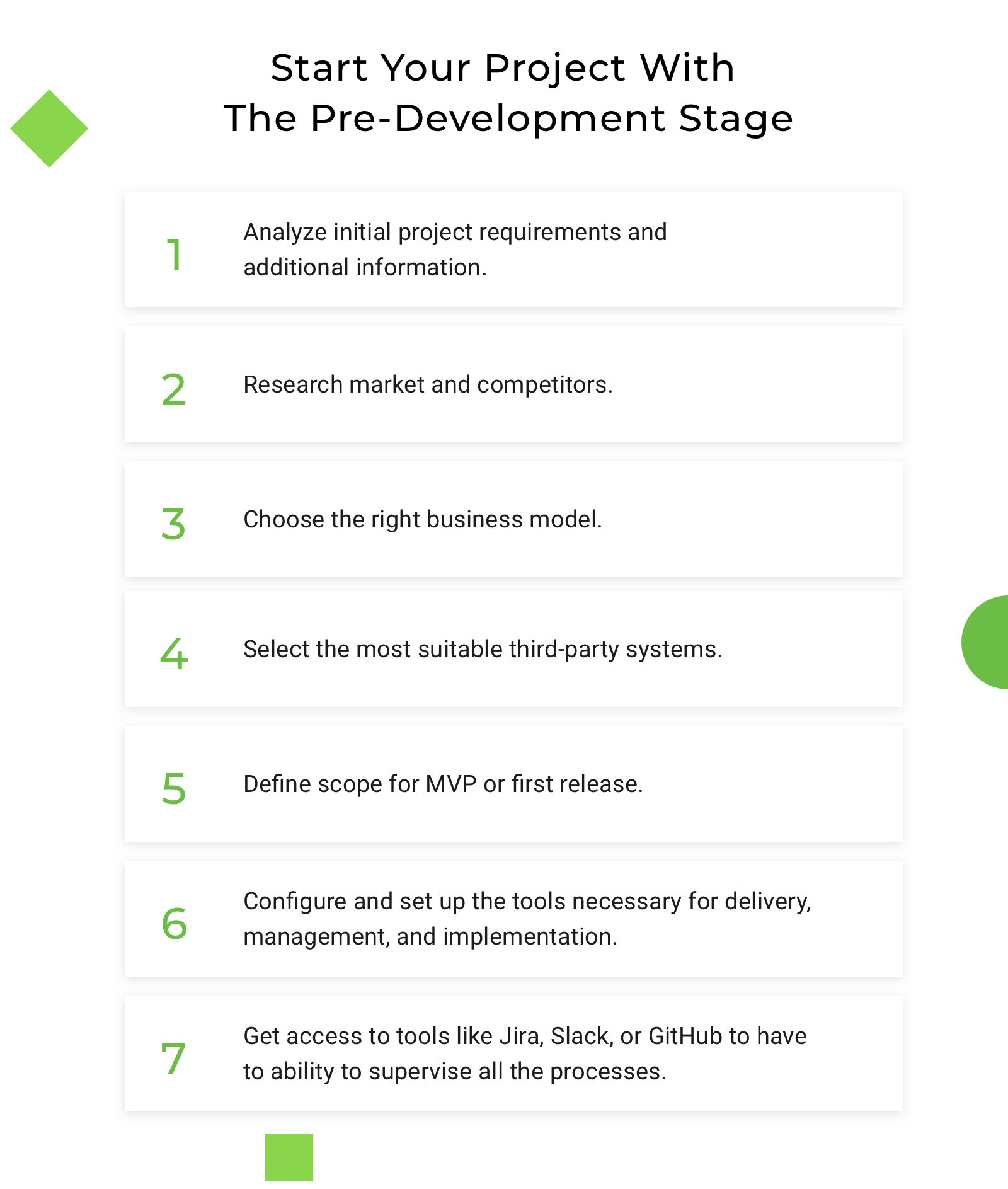
If a company is not ready to give you access to the development process of your product so you can get status updates anytime you want, you should keep looking for a more transparent technical partner to work with – most probably, it will be someone following Agile/Scrum methodology.
Anyway, having finished the Pre-Development Stage, you should have a more accurate estimate, a more comprehensive scope of work, and drafts related to the backlog, scheduling, and implementation steps.
Part of this process are different types of commitments and reports. These should guarantee timely implementation of different phases and approaching issues that may arise.
- Sprint Commitment contains the sprint goals, start and end date, duration, the list of features we’ve committed to delivering during the current sprint, and information about team capacity.
- Sprint Report shows the list of issues in each sprint, the list of features that were successfully completed or not completed during the respective sprint, and a deviation between original and spent efforts.
- Project Report provides the customer with the detailed explanation of the final result of the project.
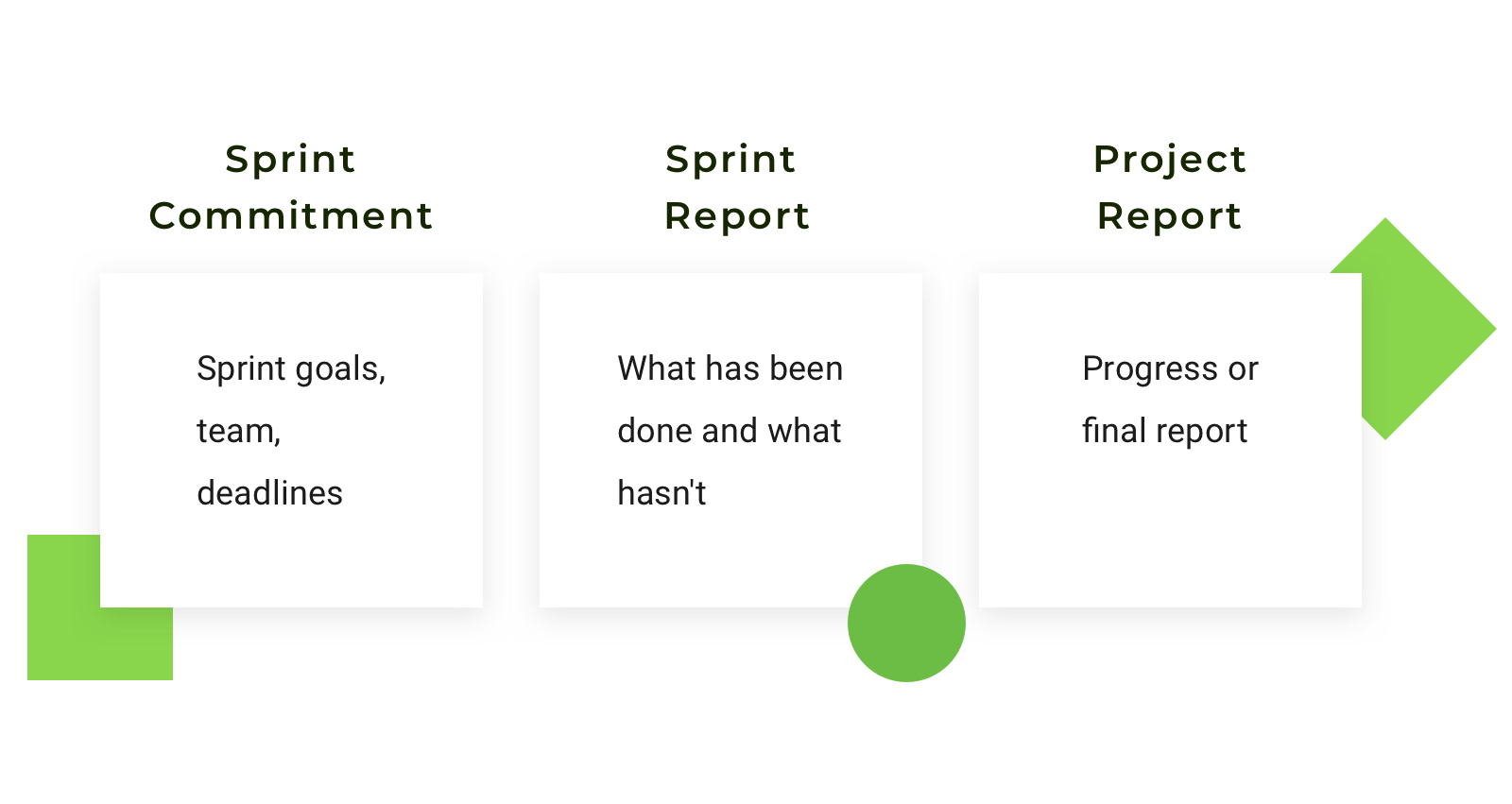
Reports may sound a bit like a drag, but they are vital to keep track of every step of the way. Make sure you settle on what information every report will give you.
Not only detailed and timely reports contribute to transparency. A reliable vendor should be able to provide access to numerous project management tools:
- Jira – issue tracking and filling the gap between project managers and developers.
- Slack – internal messaging and progress updates, code updates, deployments, system alerts, etc.
- Github – code management, using branches, code review, PEP8, and internal code convention. All code should be maintained and well documented.
- CircleCI – continuous integration and delivery platform. All code repositories are linked to CircleCI to check the code after every new update and make sure it passes all the predefined tests.
- Docker/Ansible/Fabric/lxd – creating, deploying, and running applications.
- New Relic – application performance monitoring. It shows the state of all servers and ensures their timely responses.
- Sentry – real-time error tracking. It gives insight into production deployments
and information to reproduce and fix crashes. - Confluence – project documentation management. Good understanding of how things work helps build great products. As a result, rich documentation can be created.
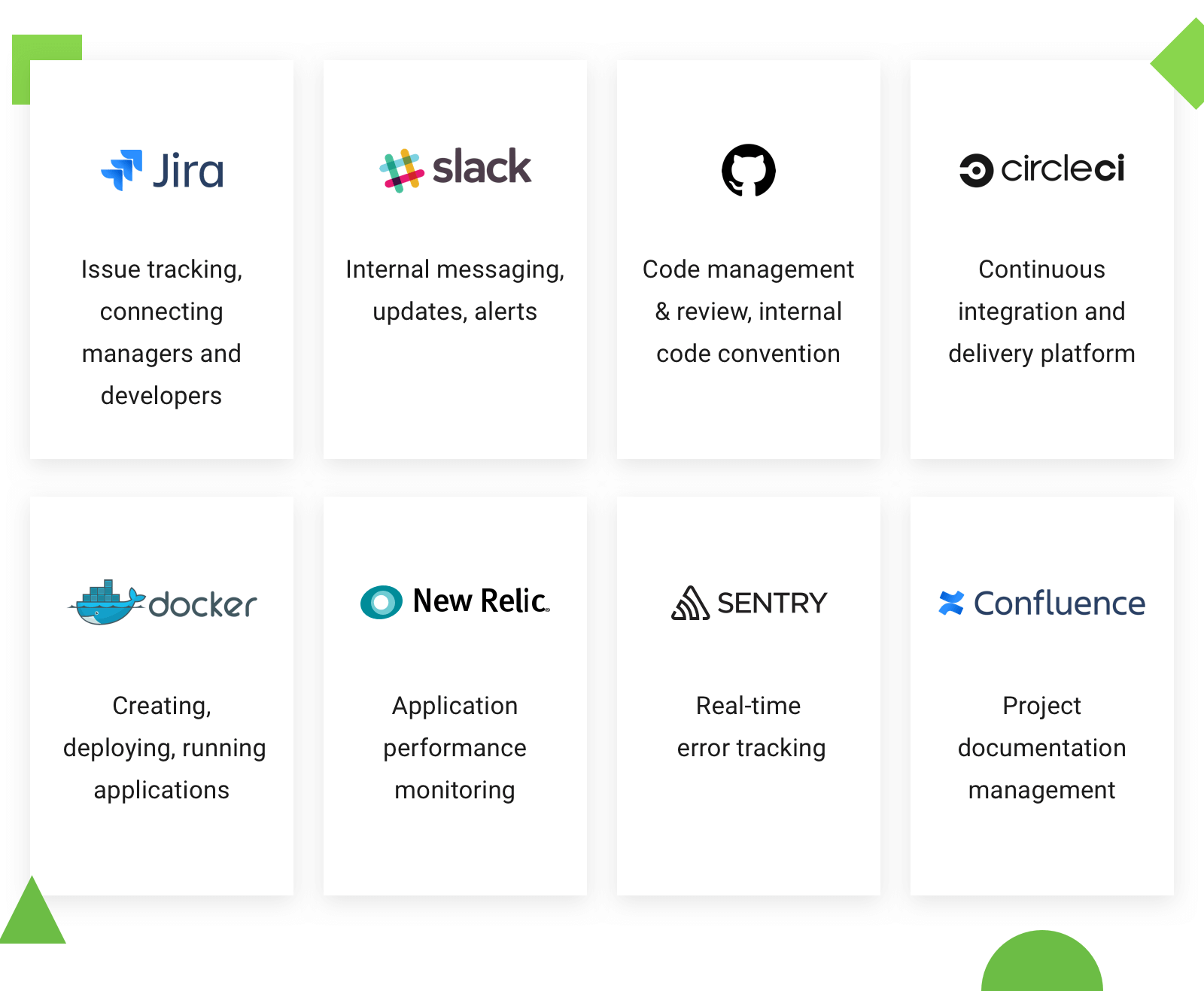
Every experience is a good one, which is why at the end of each project, you ask your tech partner to look back at what the two of you have done (unless, of course, your partner doesn’t suggest it to you yourself!). Together, you can analyze what processes and activities were successful, and which weren’t. This will allow both of you to make improvements and draw lessons that will help you in future projects.
Personal Responsibility
Good vendors don’t just develop a product and leave you hanging. They respect their client’s needs and are ready to go the extra mile to deliver the solution within the specified timeline and budget. Or better yet, to deliver even more. They will help you with support and maintenance after launch because it’s their product too.
Highly trained professionals have enough experience to understand their clients’ business processes, identify their pain points, and deal with them quickly and effectively. When the project is wrapped up successfully, it’s not only a great reward for everyone involved, but also great advertising for the team that worked on it.
Quality Control
Obviously, every good development team wants to deliver a high-quality product. To do so, they need a clearly defined strategy, test scenarios, and a systematic methodology that will lead the way to the best possible result.
Make sure your potential partner has transparent ways to control quality and has skilled QA engineers to provide quality assurance on each phase of the software development lifecycle. Check that they have everything covered, from testing the business idea to User Acceptance test and evaluation of real users’ feedback.
Demand a detailed summary of activities and test plan for your project, again, for transparency.
Maintenance and Support
One thing in common for many companies working with new tech partners is the fear to be left all alone after product launch. Ask your vendor how they will support you in this case, with maintenance, scalability, market promotion, analytics, etc.
For instance, we at Django Stars have clients that basically became family over the years. We’ve been working with MoneyPark since 2012 – together we went through many changes in the digital world and stay true to each other.
Talking about us, we work with different clients and projects, start them from scratch, and provide support and maintenance on different development stages. We treat our client’s products like our own. We had to deal with tasks of different degrees of complexity, and we’re proud to say that our expertise has never failed our clients. This is what your future technology development partner should be like, too – clever, resilient, loyal. So, don’t give up your goal to find a technical partner that will be perfect for you, as there should be no compromise when it comes to a solid product. If you need more information about tech partnership or need an advice, just let us know by filling the form below.
- How to find a developer partner for a startup?
Start with a checklist of aspects that need to be looked at. It's recommended to make sure that your potential technical partner
- has the necessary human resources,
- is suitable by areas of expertise,
- ready to provide transparency and supervision,
- shows personal responsibility,
- has transparent ways to control quality, and
- ready to help you with support and maintenance after launch.
- Where to find a tech partner for your business?
- You can search for companies that already have experience developing projects in the domain you are interested in. When choosing a technical partner to work with, consider first those who meet the above list of expectations. You can also ask for recommendations from your network or look for potential partners through online platforms and communities.
- What is the role of an IT business partner in organizational change?
- A technical partner is a vendor that will develop your product from scratch and support you all the way through. In most cases, finding a technical partner for your startup that will be right just for you becomes your key to a successful project and further on, the life of your startup. That is why the choice of a technical partner must be approached with great responsibility.
- What mistakes should be avoided when choosing a tech business partner?
- Rushing the process
- Focusing only on technical skills
- Not doing your research
- Overlooking personality fit
- Failing to define expectations
- How long does it take for a technology partnership to feel the first results?
- The time it takes to see the first results from a tech partnership can vary depending on various factors. They include the project complexity, level of competence, and effectiveness of the communication process. It's essential to have realistic expectations and be patient, as partnerships take time to develop. Establish clear goals and milestones for measuring progress and make sure that both partners are working towards a shared vision. Effective communication and collaboration can also help speed up the delivery of results.










Всего комментариев: 0